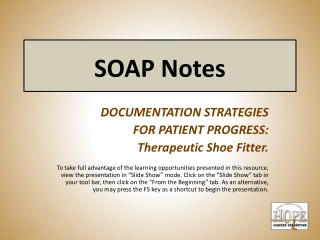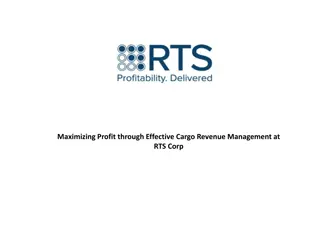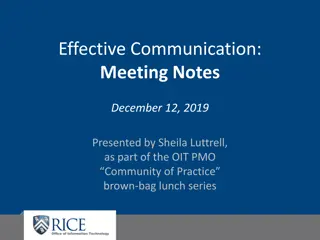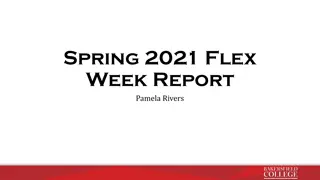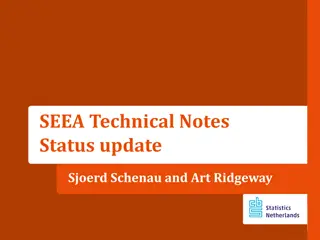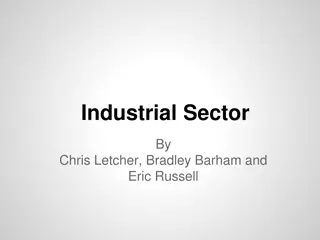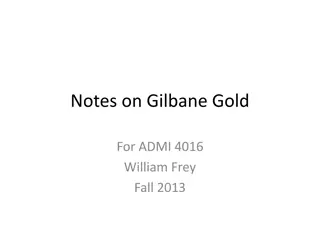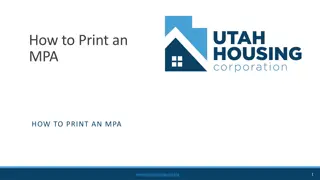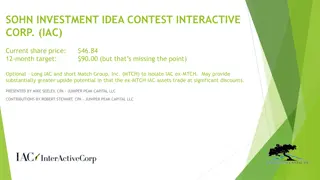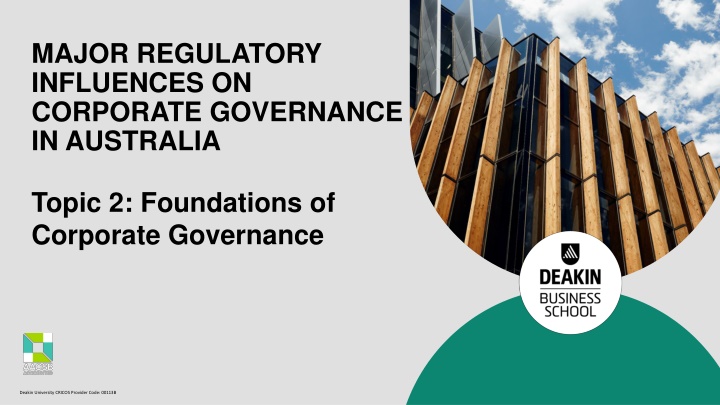
Regulatory Influences on Corporate Governance in Australia
Explore the regulatory landscape of corporate governance in Australia, covering key principles, compliance assessments, and theoretical perspectives. Dive into ASX Corporate Governance Principles and Recommendations, analyze company compliance, and discuss agency theory and stakeholder perspectives.
Uploaded on | 0 Views
Download Presentation

Please find below an Image/Link to download the presentation.
The content on the website is provided AS IS for your information and personal use only. It may not be sold, licensed, or shared on other websites without obtaining consent from the author. If you encounter any issues during the download, it is possible that the publisher has removed the file from their server.
You are allowed to download the files provided on this website for personal or commercial use, subject to the condition that they are used lawfully. All files are the property of their respective owners.
The content on the website is provided AS IS for your information and personal use only. It may not be sold, licensed, or shared on other websites without obtaining consent from the author.
E N D
Presentation Transcript
MAJOR REGULATORY INFLUENCES ON CORPORATE GOVERNANCE IN AUSTRALIA Topic 2: Foundations of Corporate Governance Deakin University CRICOS Provider Code: 00113B Deakin University CRICOS Provider Code: 00113B
Learning Outcomes At the end of today s topic, you should be able to: Explain the Australian regulatory corporate governance environment and its operation Explain the ASX Corporate Governance Principles and Recommendations Assess company compliance with the ASX Corporate Governance Principles and Recommendations 2 Deakin University CRICOS Provider Code: 00113B
References ASX (2019) Principles of Good Corporate Governance and Best Practice Recommendations. Harvey Norman (2020) Corporate Governance Statement http://www.harveynormanholdings.com.au/governance/ Tabcorp (2020) Corporate Governance Statement https://www.tabcorp.com.au/investors/annual-reports Featherstone (2016). 3 Deakin University CRICOS Provider Code: 00113B
Seminar Questions Can agency theory be extended see other stakeholders of an organisation as principals in their own right in addition to shareholders 4 Deakin University CRICOS Provider Code: 00113B
Seminar Questions Highlight the fundamental difference between the four theories. Does the theoretical foundation make any practical difference to the way that corporate governance policy is applied? 5 Deakin University CRICOS Provider Code: 00113B
Student Activity Review Picou, A. and M.J. Rubach (2006) Critique research methodology and findings Which theoretical perspective is favoured by the authors? Does firms adoption of corporate governance guidelines = good corporate governance? What is the theoretical motivation for H1? Does CAR capture a link between good corporate governance and firm performance? 6 Deakin University CRICOS Provider Code: 00113B
Student Activity Review Monem (2011). The One.Tel Collapse: Lessons for Corporate Governance 7 Deakin University CRICOS Provider Code: 00113B
Discussion - Monem (2011) Review Monem (2011). The One.Tel Collapse: Lessons for Corporate Governance This paper demonstrates that weaknesses in governance practice in relation to internal control systems, financial reporting quality, audit quality, management scrutiny, management communication with the board, and the executive pay-to-performance link can be catalysts to corporate collapse (p 340) 8 Deakin University CRICOS Provider Code: 00113B
Discussion - Monem (2011) One.Tel. management made strategic errors which led to the demise of the company. Had the system of corporate governance been more effective the bankruptcy might have been avoided, or the loss moderated. Monem (2011) provides detailed insight into what went wrong with corporate governance at One.Tel. It is noteworthy the author uses an agency theoretical framework to define corporate governance. Some of the key insights into poor corporate governance practices at One.Tel The financial statements did not faithfully represent the economic performance of One.Tel One.Tel had weak internal control (e.g. Company relaxed it credit control standards). The audit failed to issue a going concern qualified opinion. The two non-executive directors serving on the Audit Committee, Remuneration Committee, Corporate Governance Committee were not independent given their close links with the CEO. 9 Deakin University CRICOS Provider Code: 00113B
Discussion - Monem (2011) Most of the non-executive directors at One.Tel would not have qualified as independent directors . The board chairman did not always run the board meetings (attending only 7 of a possible 10 meetings). Most meetings were chaired by executive management. One of the joint CEOPs was dominant in board meetings. Monthly management information provided to board members was incomplete often missing important information (e.g., cash flow, debtors, and creditors). There was a lack of diversity of opinion from board members. The CEO actively shaped board members views on One.Tel performance and board members did not question the views of management. There was poor monitoring of management by the board. CEO compensation packages poorly designed. Link between compensation and performance was weak. Directors issued share options to directors on easy terms. 10 Deakin University CRICOS Provider Code: 00113B
Seminar questions What are the two major themes in academic research relating to the advantages of corporate governance? Are they mutually exclusive? 11 Deakin University CRICOS Provider Code: 00113B
Discussion - Seminar questions The first theme related to increased transparency and accountability in executive decision making. The second theme relates to improved economic performance. There is no reason to believe that they are mutually exclusive. 12 Deakin University CRICOS Provider Code: 00113B
Corporate Governance Regulation 13 Deakin University CRICOS Provider Code: 00113B
The Australian regulatory corporate governance environment The responsibility for setting corporate governance policy doesn t stop with any one sphere of government, market regulator or professional organisation. Corporation Act 2001- Legislative governance framework Corporation Law reform (CLERP 9) pushed some corporate governance reforms beyond a disclosure based approach to a legalistic one. E.g., Audit committees mandatory for Top 500 Financial Reporting Council (FRC) introduced International Accounting Standards -1 January 2004 ASX Corporate Governance Council (CGC) set the Principles of Corporate Governance best practice in Australia. disclosure based approach 14 Deakin University CRICOS Provider Code: 00113B
The Australian regulatory corporate governance environment an overview (cont d) What is meant by regulation? The term regulation is defined in this subject as falling anywhere on a continuum from strict legalistic interpretation (i.e. rigid legal prescription) best practice recommendations (ASX CGC) or more general guidance. 15 Deakin University CRICOS Provider Code: 00113B
The Australian regulatory corporate governance environment an overview (cont d) Corporations Act 2001 The Australian Investments and Securities Commission (ASIC) enforces compliance with the Corporations Act 2001. The common law , through its interpretation of statute, also influences corporate governance. Competition and Consumer Act 2010 (CCA) Completion policy The competition regulator the Australian Competition and Consumer Commission (ACCC) enforces compliance with the CCA. The ASX Corporate Governance Council (CGC) set the ASX corporate governance principles and monitors listed public company compliance with disclosure requirements http://www.asx.com.au/regulation/corporate-governance-council.htm 16 Deakin University CRICOS Provider Code: 00113B
ASX Corporate Governance Principles and Recommendations The IF NOT, WHY NOT APPROACH Assumes No typical organisation . Organisations to follow spirit of the principles and recommendations. Effective if not, why not reporting practices involve: identifying the recommendations the company has not followed explaining why the company has not followed the relevant recommendation explaining how its practices accord with the spirit of the relevant principle, that the company understands the relevant issues and has considered the impact of its alternative approach. 17 Deakin University CRICOS Provider Code: 00113B
The ASX Corporate Governance Council (CGC) THE ASX CGC COMPOSITION Groups from prominent business backgrounds and industries. to develop and issue principles-based recommendations on the corporate governance practices to be adopted by ASX listed entities. to promote investor confidence and to assist listed entities to meet stakeholder expectations in relation to their governance. The wide representation gives rise to two major advantages. 1. Varied and significant practical expertise to help frame corporate governance policy. 2. The profile of member groups helps give significant credibility to the entire process. Q. Is current membership representative? https://www.asx.com.au/regulation/corporate-governance-council/corporate-governance- council-membership.htm Mission is to develop a principles based framework for corporate governance. 18 Deakin University CRICOS Provider Code: 00113B
The ASC CGC principles Most listed companies where practical choose to embrace the 8 principles. Because they believe implementing the ASX CGC recommendations adds value or they feel it would result in bad publicity if they didn t! ASX principles constantly evolving (improving) Fourth Edition of the Corporate Governance Principles and Recommendations released in 2019 CG principles are however not held in universal esteem! ASX has on a number of occasions lost some responsibilities to government. E.g., Monitoring insider trading 19 Deakin University CRICOS Provider Code: 00113B
ASX - Principles of Good Corporate Governance The eight core principles that they claim underlie good corporate governance (ASX 2019) : 1. Lay solid foundations for management and oversight. (weeks 1-3) 2. Structure the board to be effective and add value (Weeks 1-3) 3. Instil a culture of acting lawfully, ethically and responsibly (Weeks 6-8) 4. Safeguard Integrity of corporate reporting (Week 3) 5. Make timely and balanced disclosure 6. Respect the rights of security holders 7. Recognise and manage risk 8. Remunerate fairly and responsibly (Week 4) 20 Deakin University CRICOS Provider Code: 00113B
Manager/ CEO Report Capital Budgeting Decisions 7. Recognize and manage risk 8. Remunerate fairly and responsibly Monitor $ Disclosure $ A Corporation Liabilities Exercising Right Assets $ Equity $ $ Claims: Stocks Investor Board of directors/Chairman What do boards do? 1. Lay solid foundation for management and oversight. 2. Structure board to add value 3. Act ethically and responsibly 4. Safeguard reporting 5. Make timely and balance disclosure 6. Respect the rights and security holders Information Asymmetry 21 Deakin University CRICOS Provider Code: 00113B
Corporate Governance: ASX Definition Corporate Governance Defined (ASX 2019). The phrase corporate governance describes the framework of rules, relationships, systems and processes within and by which authority is exercised and controlled within corporations. It encompasses the mechanisms by which companies, and those in control, are held to account 22 Deakin University CRICOS Provider Code: 00113B
Principle One Lay solid foundations for management and oversight A listed entity should clearly delineate the respective roles and responsibilities of its board and management and regularly review their performance. 23 Deakin University CRICOS Provider Code: 00113B
Activity What are the major responsibilities of a board of directors? What are the major responsibilities of management? 24 Deakin University CRICOS Provider Code: 00113B
Principle One Recommendation 1.2 Recommendation 1.2: A listed entity should: (a) undertake appropriate checks before appointing a director or senior executive or putting someone forward for election as a director; and (b) provide security holders with all material information in its possession relevant to a decision on whether or not to elect or re- elect a director. 25 Deakin University CRICOS Provider Code: 00113B
Principle One Recommendations 1.3 & 1.4 Recommendation 1.3 A listed entity should have a written agreement with each director and senior executive setting out the terms of their appointment. Recommendation 1.4 The company secretary of a listed entity should be accountable directly to the board, through the chair, on all matters to do with the proper functioning of the board. 26 Deakin University CRICOS Provider Code: 00113B
Principle One Recommendation 1.5 A listed entity should: (a) have and disclose a diversity policy; (b) through its board or a committee of the board set measurable objectives for achieving gender diversity in the composition of its board, senior executives and workforce generally; and 27 Deakin University CRICOS Provider Code: 00113B
Principle One Recommendation 1.5 (c) disclose in relation to each reporting period: 1) the measurable objectives set for that period to achieve gender diversity; 2) the entity s progress towards achieving those objectives; and 3) the respective proportions of men and women on the board, in senior executive positions and across the whole workforce; or 28 Deakin University CRICOS Provider Code: 00113B
Principle One Recommendation 1.6 A listed entity should: (a) have and disclose a process for periodically evaluating the performance of the board, its committees and individual directors; and (b) disclose, in relation to each reporting period, whether a performance evaluation was undertaken in the reporting period in accordance with that process. 29 Deakin University CRICOS Provider Code: 00113B
Principle One Recommendation 1.7 A listed entity should: (a) have and disclose a process for evaluating the performance of its senior executives at least once every reporting period; and (b) disclose for each reporting period whether a performance evaluation has been undertaken in accordance with that process during or in respect of that period. 30 Deakin University CRICOS Provider Code: 00113B
Principle Two: Structure the board to be effective and add value A listed entity should have a board of an appropriate size, composition, skills and commitment to enable it to discharge its duties effectively Baring bank! An effective board will challenge management and hold them to account, and also represent the best interests of security holders as a whole rather than those of individual security holders or interest groups Ultimately the directors are elected by the shareholders. However, the board influences the selection of candidates for shareholder vote. The BofD discussed in more detail in week 3 31 Deakin University CRICOS Provider Code: 00113B
Principle Two Recommendation 2.1 Have a nomination committee which: Has at least three members, a majority of whom are independent directors; and chaired by an independent director Q: What is a nomination committee and what is its role? A: Week 4 32 Deakin University CRICOS Provider Code: 00113B
Principle Two Recommendation 2.2 A listed entity should have and disclose a board skills matrix setting out the mix of skills that the board currently has or is looking to achieve in its membership. Why do shareholders want to know the skills that directors possess? it would be helpful to investors for the entity to explain what it means when it refers to a particular skill in its board skills matrix and he criteria a director must meet to be considered to have that skill. 33 Deakin University CRICOS Provider Code: 00113B
Principle Two Recommendation 2.3 A listed entity should disclose: (a) the names of the directors considered by the board to be independent directors; (b) if a director has an interest, position, association or relationship of the type described in Box 2.3 but the board is of the opinion that it does not compromise the independence of the director, the nature of the interest, position, association or relationship in question and an explanation of why the board is of that opinion; and (c) the length of service of each director 34 Deakin University CRICOS Provider Code: 00113B
35 Deakin University CRICOS Provider Code: 00113B
Principle Two Recommendation 2.4 Recommendation 2.4 A majority of the board of a listed entity should be independent directors. Q: So how you assess the independence of a director? Next Week 36 Deakin University CRICOS Provider Code: 00113B
Principle Two Recommendation 2.5 & 2.6 Recommendation 2.5 The chair of the board of a listed entity should be an independent director and, in particular, should not be the same person as the CEO of the entity. Recommendation 2.6 A listed entity should have a program for inducting new directors and provide appropriate professional development opportunities for directors to develop and maintain the skills and knowledge needed to perform their role as directors effectively. 37 Deakin University CRICOS Provider Code: 00113B
Student Activity Review the corporate governance statement of Harvey Norman (2020) and Tabcorp (2020) with regard to principles 1 & 2. Discuss compliance with the ASX recommendations. 38 Deakin University CRICOS Provider Code: 00113B
Student activity Q. What are the two major goals of a director? A: Q. Potential costs of directors not following the recommendations on independence? A: 39 Deakin University CRICOS Provider Code: 00113B
Student Activity Review summary of research article by Featherstone (2016) which questions the benefit of board comprising only independent directors. Homework 40 Deakin University CRICOS Provider Code: 00113B
Student Activity In 2010 the Singapore Exchange proposed a merger with ASX (i.e., A takeover of the ASX A listed public Company). The then treasurer blocked the merger in 2011 Q. Comment on the cost v benefit of the proposed merger. Q. Would the merged exchange promote better corporate governance? 41 Deakin University CRICOS Provider Code: 00113B
Principle Three: Instil a culture of acting lawfully, ethically and responsibly A listed entity should instil and continually reinforce a culture across the organisation of acting lawfully, ethically and responsibly. Recommendation 3.1 A listed entity should articulate and disclose its values Ethics review in detail weeks 6-8 42 Deakin University CRICOS Provider Code: 00113B
Principle Three: Instil a culture of acting lawfully, ethically and responsibly Recommendation 3.2 A listed entity should: a) have and disclose a code of conduct for its directors, senior executives and employees; and b) ensure that the board or a committee of the board is informed of any material breaches of that code. Ethics review in detail weeks 6-8 43 Deakin University CRICOS Provider Code: 00113B
Principle Three: Instil a culture of acting lawfully, ethically and responsibly Recommendation 3.3 A listed entity should: a) have and disclose a whistle-blower policy; and b) ensure that the board or a committee of the board is informed of any material incidents reported under that policy 44 Deakin University CRICOS Provider Code: 00113B Whistle-blower policy considered in weeks 9 &10
Principle Three: Instil a culture of acting lawfully, ethically and responsibly Recommendation 3.4 A listed entity should: a) have and disclose an anti-bribery and corruption policy; and b) ensure that the board or a committee of the board is informed of any material breaches of that policy. Bribery and corruption considered as part of fraud in weeks 9-11 45 Deakin University CRICOS Provider Code: 00113B
Principle Four: Safeguard the integrity of Corporate Reports Note focus on all corporate reports not just financial reporting A listed entity should have formal and rigorous processes that independently verify and safeguard the integrity of its corporate reporting. Structure to ensure credible financial reports Audit committee CEO and CFO a declaration Independent and competent external audit. Does not diminish ultimate responsibility of the board (i.e., Centro 2012) Review in detail week 3 46 Deakin University CRICOS Provider Code: 00113B
Principle Four: Safeguard the integrity of Corporate Reports Recommendation 4.1 The board of a listed entity should: (a) have an audit committee 47 Deakin University CRICOS Provider Code: 00113B
Principle Four: Safeguard the integrity of Corporate Reports Recommendation 4.2 The board of a listed entity should, before it approves the entity s financial statements for a financial period, receive from its CEO and CFO a declaration that, in their opinion, the financial records of the entity have been properly maintained and that the financial statements comply with the appropriate accounting standards and give a true and fair view of the financial position and performance of the entity and that the opinion has been formed on the basis of a sound system of risk management and internal control which is operating effectively 48 Deakin University CRICOS Provider Code: 00113B
Principle Four: Safeguard the integrity of Corporate Reports Recommendation 4.3 A listed entity should disclose its process to verify the integrity of any periodic corporate report it releases to the market that is not audited or reviewed by an external auditor Opens the door for development of Integrated reporting <IR> 49 Deakin University CRICOS Provider Code: 00113B
Principle Five: Make timely and balanced disclosure A listed entity should make timely and balanced disclosure of all matters concerning it that a reasonable person would expect to have a material effect on the price or value of its securities. All investors have equal and timely access to material information concerning the company Company announcements are factual and presented in a clear and balanced way. Balance requires disclosure of both positive and negative information. 50 Deakin University CRICOS Provider Code: 00113B

